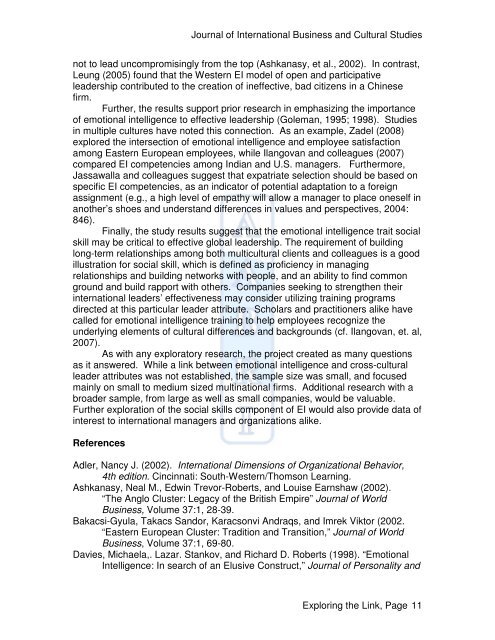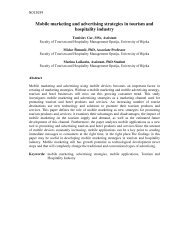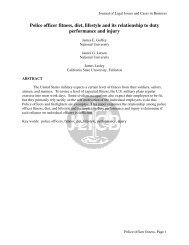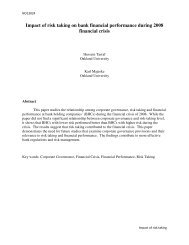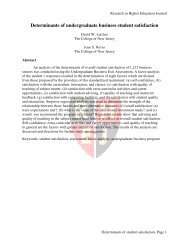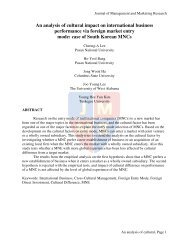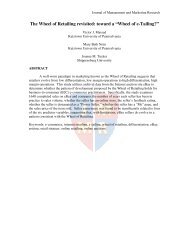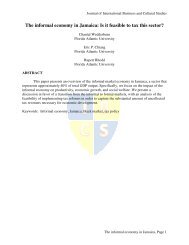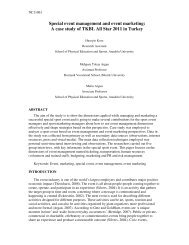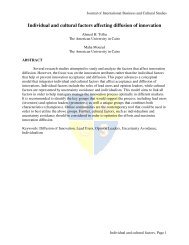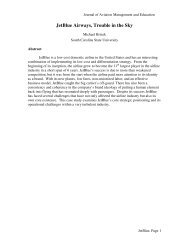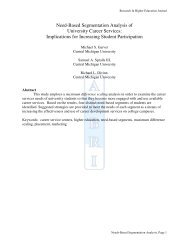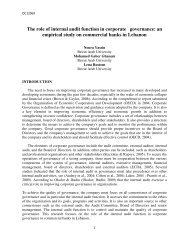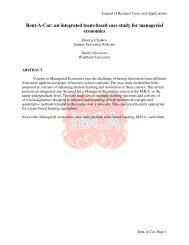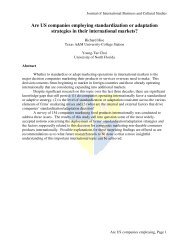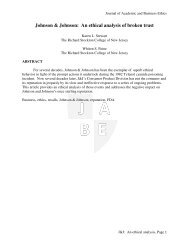Exploring the Link between Emotional Intelligence and Cross ...
Exploring the Link between Emotional Intelligence and Cross ...
Exploring the Link between Emotional Intelligence and Cross ...
Create successful ePaper yourself
Turn your PDF publications into a flip-book with our unique Google optimized e-Paper software.
Journal of International Business <strong>and</strong> Cultural Studies<br />
not to lead uncompromisingly from <strong>the</strong> top (Ashkanasy, et al., 2002). In contrast,<br />
Leung (2005) found that <strong>the</strong> Western EI model of open <strong>and</strong> participative<br />
leadership contributed to <strong>the</strong> creation of ineffective, bad citizens in a Chinese<br />
firm.<br />
Fur<strong>the</strong>r, <strong>the</strong> results support prior research in emphasizing <strong>the</strong> importance<br />
of emotional intelligence to effective leadership (Goleman, 1995; 1998). Studies<br />
in multiple cultures have noted this connection. As an example, Zadel (2008)<br />
explored <strong>the</strong> intersection of emotional intelligence <strong>and</strong> employee satisfaction<br />
among Eastern European employees, while Ilangovan <strong>and</strong> colleagues (2007)<br />
compared EI competencies among Indian <strong>and</strong> U.S. managers. Fur<strong>the</strong>rmore,<br />
Jassawalla <strong>and</strong> colleagues suggest that expatriate selection should be based on<br />
specific EI competencies, as an indicator of potential adaptation to a foreign<br />
assignment (e.g., a high level of empathy will allow a manager to place oneself in<br />
ano<strong>the</strong>r’s shoes <strong>and</strong> underst<strong>and</strong> differences in values <strong>and</strong> perspectives, 2004:<br />
846).<br />
Finally, <strong>the</strong> study results suggest that <strong>the</strong> emotional intelligence trait social<br />
skill may be critical to effective global leadership. The requirement of building<br />
long-term relationships among both multicultural clients <strong>and</strong> colleagues is a good<br />
illustration for social skill, which is defined as proficiency in managing<br />
relationships <strong>and</strong> building networks with people, <strong>and</strong> an ability to find common<br />
ground <strong>and</strong> build rapport with o<strong>the</strong>rs. Companies seeking to streng<strong>the</strong>n <strong>the</strong>ir<br />
international leaders’ effectiveness may consider utilizing training programs<br />
directed at this particular leader attribute. Scholars <strong>and</strong> practitioners alike have<br />
called for emotional intelligence training to help employees recognize <strong>the</strong><br />
underlying elements of cultural differences <strong>and</strong> backgrounds (cf. Ilangovan, et. al,<br />
2007).<br />
As with any exploratory research, <strong>the</strong> project created as many questions<br />
as it answered. While a link <strong>between</strong> emotional intelligence <strong>and</strong> cross-cultural<br />
leader attributes was not established, <strong>the</strong> sample size was small, <strong>and</strong> focused<br />
mainly on small to medium sized multinational firms. Additional research with a<br />
broader sample, from large as well as small companies, would be valuable.<br />
Fur<strong>the</strong>r exploration of <strong>the</strong> social skills component of EI would also provide data of<br />
interest to international managers <strong>and</strong> organizations alike.<br />
References<br />
Adler, Nancy J. (2002). International Dimensions of Organizational Behavior,<br />
4th edition. Cincinnati: South-Western/Thomson Learning.<br />
Ashkanasy, Neal M., Edwin Trevor-Roberts, <strong>and</strong> Louise Earnshaw (2002).<br />
“The Anglo Cluster: Legacy of <strong>the</strong> British Empire” Journal of World<br />
Business, Volume 37:1, 28-39.<br />
Bakacsi-Gyula, Takacs S<strong>and</strong>or, Karacsonvi Andraqs, <strong>and</strong> Imrek Viktor (2002.<br />
“Eastern European Cluster: Tradition <strong>and</strong> Transition,” Journal of World<br />
Business, Volume 37:1, 69-80.<br />
Davies, Michaela,. Lazar. Stankov, <strong>and</strong> Richard D. Roberts (1998). “<strong>Emotional</strong><br />
<strong>Intelligence</strong>: In search of an Elusive Construct,” Journal of Personality <strong>and</strong><br />
<strong>Exploring</strong> <strong>the</strong> <strong>Link</strong>, Page 11


